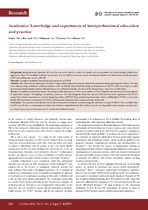| dc.contributor.author | Julie, Hester | |
| dc.contributor.author | Hess-April, Lucia | |
| dc.contributor.author | Wilkenson, J. | |
| dc.contributor.author | Cassiem, Wagheda | |
| dc.contributor.author | Rhoda, Anthea | |
| dc.date.accessioned | 2018-05-14T11:44:56Z | |
| dc.date.available | 2018-05-14T11:44:56Z | |
| dc.date.issued | 2016 | |
| dc.identifier.citation | Julie, H. et al. (2016). Academics’ knowledge and experiences of interprofessional education and practice. African Journal of Health Professions Education, 8(2 Suppl 2): 222-224. | en_US |
| dc.identifier.issn | 2078-5127 | |
| dc.identifier.uri | http://dx.doi.org/10.7196/AJHPE.2016.v8i2.845 | |
| dc.identifier.uri | http://hdl.handle.net/10566/3661 | |
| dc.description.abstract | BACKGROUND. Interprofessional education (IPE) can be seen as the vehicle to address the health and social problems of society through collaborative
approaches. Since IPE should be facilitated by educators who are skilled in this area, faculty development initiatives should be based on the principles
of IPE and collaborative practice (IPECP).
OBJECTIVE. To explore academics’ knowledge and experiences of IPECP.
METHODS. The study used an exploratory descriptive design and the appreciative inquiry framework underpinned data gathering and analysis. The data
were collected using workshops, and the participants of the workshops shared their knowledge and experiences of IPECP, which were audio-recorded
and analysed using thematic analysis. Ethical clearance was obtained from the University of the Western Cape, Cape Town, South Africa.
RESULTS. The analysis revealed three themes: knowledge of IPE; experiences of IPECP; and enablers of IPECP aligned to the dream and discovery phases
of appreciative inquiry. The findings revealed that academics were knowledgeable about the concept of IPE and that their experiences with IPECP
ranged from clinical supervision to research. Regarding enablers of IPECP, they provided important input, which could facilitate IPECP in a university
faculty. These included competencies for IPECP, professional development and a common practice framework.
CONCLUSION. The academics who attended the faculty development workshops were knowledgeable about the concepts of IPECP. They concluded that
for IPE to be effective, a common practice framework should be adopted in the faculty to inform specific teaching and learning strategies and outcomes. | en_US |
| dc.language.iso | en | en_US |
| dc.publisher | Health and Medical Publishing Group | en_US |
| dc.rights | This open-access article is distributed under
Creative Commons licence CC-BY-NC 4.0. | |
| dc.subject | Interprofessional education (IPE) | en_US |
| dc.subject | Health and social problems | en_US |
| dc.subject | Collaborative practice | en_US |
| dc.title | Academics’ knowledge and experiences of interprofessional education and practice | en_US |
| dc.type | Article | en_US |
| dc.privacy.showsubmitter | FALSE | |
| dc.status.ispeerreviewed | TRUE | |
| dc.description.accreditation | DHET | |

